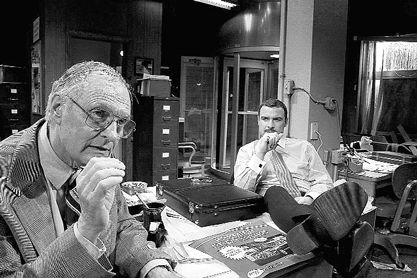When the stakes are highest, Mamet’s mad hucksters stoop real low
What is it these days with Broadway and testosterone?
For months now, the surprise hit “Twelve Angry Men” has amazed audiences with its star-powered, all-male fireworks. Its initial limited run was extended seven times. Though it must close on May 15 to make way for another show, there’s already a strapping new man-play in town.
“Glengarry Glen Ross,” a supercharged revival of the 1984 Pulitzer Prize-winning drama about the underbelly of the real estate market, boasts a muscular, big-name cast and enough explosives to make “Twelve Angry Men” seem absolutely quaint by comparison.
This is the world of David Mamet, whose sardonically bleak portrait of survival among the fiercest still has a way of getting deep under your skin, even after 21 years. With his trademark rhythmic repetitions and pauses, spiked with enough expletives to make Chris Rock wince, “Glengarry Glen Ross” now reigns as the badass bully of Broadway.
The lean, unrelenting drama is crisply directed by Joe Mantello, who won a 2003 Tony Award for another guys-only extravaganza, “Take Me Out.”
The mellifluously cryptic title, which is pure Mamet, by the way, refers to two housing tracts in a Florida backwater that these con artists are trying to unload on unsuspecting investors.
The hamster-wheel of a life they’ve chosen strains under the weight of a catchy axiom, “Always Be Closing,” that’s virtually impossible to sustain. The top closer scores a Cadillac, but fail to get your name on the board, no matter how winning your previous track record, and you get a pink slip.
The first act, which features various pairs of scheming salesmen, takes place in a seedy Chinese restaurant drenched in out-for-blood red. The second act unfolds in the boiling cauldron of the Premier Properties sales office, where spirits are broken as easily as the plate-glass window that’s been smashed overnight during a burglary.
Tony-winner Santo Loquasto, who was recently inducted into the Theater Hall of Fame, designed the convincingly detailed sets.
And what a terrific ensemble. Alan Alda dazzles as the washed-up Shelly Levene who is dancing as fast as he can to convince the office manager (Frederick Weller) to give him one more shot. Weller, who strutted his stuff to much acclaim in “Take Me Out,” is coolly simmering as the callow marshal of the sales leads.
Gordon Clapp (an “NYPD Blue” Emmy winner) is superb as the smarmy racist Dave Moss who hatches a plan that will turn the office upside-down. Jeffrey Tambor is a galvanizing presence as the balding, beleaguered George Aaronow who Moss tries to recruit as an accomplice.
As the nebbish client who tries to back out of a deal, Tom Wopat (“42nd Street”) is awesomely unrecognizable. Jordan Lage also impresses as the brass-tacks detective, Baylen.
But for my money, the show belongs to Liev Schreiber, as the cocksure king of the hill, Richard Roma. With his slick, cigarette-puffing, mustachioed machismo, he could persuade a drowning man to part with his life vest—but when the walls start tumbling down around him, Roma hisses and claws like a cornered jackal. Having exhausted the F-word and sundry other insults, he resorts to the C- word, to maximum effect.
These men resent each other and, when push comes to shove, they don’t bother to hide it. “I never liked you,” Moss snarls at Roma, and it stings more than any curse word.
So, is there a soft moral core somewhere beneath the play’s tough exterior? Perhaps, though it’s hardly optimistic. Near play’s end, Roma laments, “It’s not a world of men… it’s a world of clockwatchers, bureaucrats and officeholders… what it is, it’s a fucked-up world… We are the members of a dying breed.”
If he’s right, maybe that helps explain Broadway’s fascination with masculine drama.
Despite the bracing performances and impressive pedigree, though, “Glengarry Glen Ross” may be too pushy for its own good. These desperate men, while made of flesh and blood, have hearts of stone. Amid all the petulant name-calling and one-upmanship, they’ll say and do anything to save their sorry souls.
Even though my own heart was turning progressively harder with each barb, I never grew numb to the play’s abundant charms.
gaycitynews.com



































